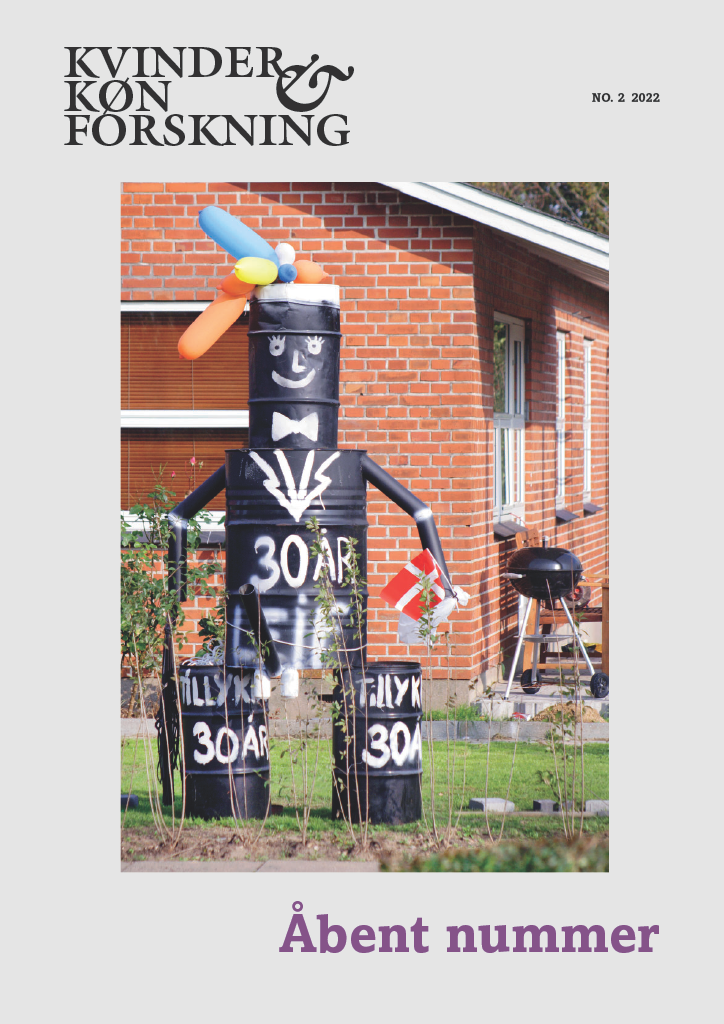Different readings and evoked conversations
A piece on the generative power of dialogue and co-thinking
DOI:
https://doi.org/10.7146/kkf.v34i1.132248Nøgleord:
dialog, samskabelse, viden og proces, feministisk forskning, othering, decolonial thinking, affect in collaborative researchResumé
In this dialogic piece we insist on the value of keeping alive critical debates about how academic knowledge is produced, when it comes to understanding the complexities involved in laying bare the impact of socioeconomic and sociocultural differences crossing borders and contexts. The climate for conversations about difference is constructed and moved by sentiments like rage, shame, guilt, and resentment but also connectedness and shared excitement. Human conversations across difference involve risk-taking but also engagement, evocation and inspiration. Here we make a humble intent to do so, taking as a point of departure our participation in a symposium held to launch Christina Hee Pedersen’s book Collaborative Research Methodologies (2021). We use collaborative writing as a method of inquiry to explore how our understandings of concepts like intersectionality, social in- and exclusion, social justice and different knowledge forms represent a challenge to academic subjects within a pronounced audit culture, fi lled with competition and unequal employment conditions. We argue that explorative conversations are pivotal to cultivate feminist, anti-racist and decolonial pockets of critical, collaborative research and teaching practices.
Referencer
Anzaldúa, G. 1987. Borderlands / La Frontera: The New Mestiza. San Francisco: Aunt Lute Books.
Bakhtin, M. 1981. Discourse in the Novel. In: Holquist M. eds. The Dialogic Imagination. Four Essays by M. Bakhtin. Austin: University of Texas Press, 259-422.
Bochner, A. P. and Ellis, C. 2016. Evocative Autoethnography Writing Lives and Telling Stories. New York and London: Routledge.
Bourdieu, P. 1986. The Biographical Illusion. New York: Sage.
Churampi Ramírez, A. 2009. Who Does a “Literate Native” Represent? The Case of Guaman Poma de Ayala. Latin American Indian Literatures Journal. A Review of American Indian Texts and Studies. Vol. 25(2), 134-151.
Crenshaw, K. Gotanda, N. and Peller, G. 1996. Critical Race Theory: The Key Writings That Formed the Movement. New York: The New Press.
Du Bois, W. E. B. 1993. The Souls of Black Folk. New York: Knopf Doubleday Publishing Group.
Hall, S. eds. 1997. Representation: Cultural Representations and Signifying Practices. Maidenhead: The Open University Press.
hooks, b. 1994. Teaching to Transgress: Education as the Practice of Freedom: New York: Routledge.
Hill Collins, P. 2000. Black Feminist Thought: Knowledge, Consciousness, and the Politics of Empowerment [2nd edition]. New York: Routledge.
Hultman, K. and Taguchi, H. L. 2010. Challenging anthropocentric analysis of visual data: A relational materialist methodological approach to educational research. International Journal of Qualitative Studies in Education. 23(5), 525–542.
Jitsuya, N. and Sevilla, R. 2004. All the bridges that we build: lesbophobia and sexism within the women’s and gay movements in Peru. Journal of Gay and Lesbian Social Services. 16(1), 1–28.
Maldonado-Torres N. 2007. On the coloniality of being: Contributions to the development of a concept. Cultural Studies. 21(2-3), 240-270.
Mendoza, B. 2014. Ensayos de crítica feminista en nuestra América. Feminismos latinoamericanos de otro modo. México: Herder.
Mendoza, B. 2015. Coloniality of Gender and Power: From Postcoloniality to Decoloniality. In: Disch L. and Hawkesworth, M. eds. Oxford Handbook of Feminist Theory. Oxford: Oxford University Press, 100-121.
Mendoza, B. 2018. Can the subaltern save us?. Tapuya: Latin American science, technology and society. 1(1), 109-122.
Monhanty, C. T. 1997. Under Western Eyes: Feminist Scholarship and Colonial Discourses. In: McClintock, A. Mufti, A. and Skohat, E. eds. Dangerous Liaisons. Gender, Nation, and Postcolonial Perspectives. Minneapolis and London: University of Minnesota Press, 196-220.
Olesen, B. R. and Pedersen C. H. 2013. Co-Producing Knowledge: Between Othering, Emotionality and Dialogue. In: Phillips, L., Kristiansen, M., Vehvilainen, M. and Gunnarsson, E. eds. Knowledge and Power in Collaborative Research: A Reflexive Approach. London and New York: Routledge, 124-152.
Pedersen, C. H. 2021. Crafting Collaborative Research Methodologies. Leaps and Bounds in Interdisciplinary Inquiry. London and New York: Routledge.
Pedersen, C. H. and Phillips, L. J. 2019. Qualitative Qualities, Meaningful Measurements? A Collaborative Exploration of the Performativity of “Quality” in the Audit Culture. International Review of Qualitative Research. 12(4), 433–452.
Phillips, L. 2011. The Promise of Dialogue. The dialogic turn in the production and communication of knowledge. Amsterdam: John Benjamins Publishing Company.
Phoenix, A. 2013. Analysing narrative contexts. In Andrews, M., Squire, C. and Tamboukou, M. eds. Doing Narrative Research. London: Sage, 72-88.
Pratt, M. L. 1991. Arts of the Contact Zone. Profession. 33-40
Spivak, G. C. 1988. Can the subaltern speak? In: Nelson, C. and Grossberg, L. eds. Marxism and the Interpretation of Culture. Urbana and Chicago: University of Illinois Press, 271–313.
St. Pierre, E. A. 2011. Post Qualitative Research: The Critique and the Coming After. In Denzin, N. K. and Lincoln, Y. S. eds. The Sage Handbook of Qualitative Research. Thousand Oaks, CA: Sage, 611-626.
Downloads
Publiceret
Citation/Eksport
Nummer
Sektion
Licens
Copyright (c) 2023 Christina Hee Pedersen, Breny Mendoza, Adriana Churampi

Dette værk er under følgende licens Creative Commons Navngivelse –Ikke-kommerciel (by-nc).
Udgivelser i Kvinder, Køn og Forskning er beskyttet under Creative Commons License: CC Attribution-NonCommercial 4.0

